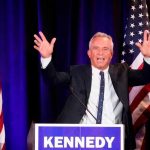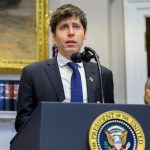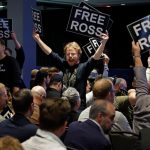[I am serializing my short Harvard Law Review Forum essay titled “Free Speech and Private Power”, responding to the Harvard Law Review’s publication of Evelyn Douek & Genevieve Lakier’s excellent new article, Lochner.com? I actually agree with much of what Douek & Lakier say, but offer a somewhat different perspective on the matter, mostly asking what the Court’s recent cases mean going forward, rather than trying to critique them.]
[This post is about Lindke v. Freed, which (to oversimplify) held that a public official’s blocking commenters from the official’s social media page based on their viewpoints constitutes “state action” and thus potentially violates the First Amendment “only if the official (1) possessed actual authority to speak on the State’s behalf, and (2) purported to exercise that authority when he spoke on social media. The appearance and function of the social-media activity are relevant at the second step, but they cannot make up for a lack of state authority at the first.”]
Lindke, like Murthy [v. Missouri], asked the Court to draw a line between public power, which is constrained by the First Amendment, and private power, which is not. But in Lindke, a government official was indubitably acting: The question was whether the official was acting as an official or as a private citizen.
Here I think I disagree in some measure with Douek and Lakier’s analysis, though more as a matter of emphasis: I appreciate their critiques of the Lindke opinion, but think that on balance the opinion makes sense, because the “space of privacy for government officials when they use[] social media to publicize their work and promote their political agenda” is indeed worth preserving.
Before being anything else, after all, officials are people. They often act the way other people act, and are entitled to considerable latitude in doing so. Thus, for instance, even when the Establishment Clause was seen as generally restricting governmental endorsement of religion, individual officials remained free to go to church and avow their own faith, in their individual capacities—and even to include religious references in their public speeches. Indeed, attempts to protect the state from undue capture by the church were themselves struck down on First Amendment grounds when they interfered with officials’ ability to be both public servants and clergy members. Likewise, equal protection principles limit government officials’ power to discriminate based on sex when choosing government employees, but presumably not when choosing, say, roommates, where such discrimination may itself be constitutionally protected.
Government officials running for reelection often give speeches that are understood as their own private expression. A candidate for initial election is free to organize an event that’s only open to those who support the campaign, or allow public attendance generally but exclude attendees who display signs or wear clothing that supports the other side. A candidate for reelection is free to do the same. An officeholder’s excluding people based on their political affiliation or political viewpoint may be forbidden when the officeholder is acting as officeholder, but permitted when acting as candidate.
And this remains true, I think, even when the campaign speech describes the officeholder’s accomplishments, or announces new plans. Officeholders acting as officeholders may announce their new plans as part of their jobs, or otherwise speak in a way that “facilitat[es] their performance of their [government] responsibilities” with “the purpose and effect of influencing the behavior of others.” But I don’t think this keeps them from doing so at campaign rallies, or requires them to admit adversaries to their rallies.
Nor is this a special feature of reelection campaigns (especially since many politicians are always acting with an eye toward the next election). Rather, it just reflects that government officials wear two hats, a governmental and an individual. When I was a UCLA professor, I was constrained by the First Amendment in my official decisions—I couldn’t just give lower grades based on a student’s party affiliation, I think—but it doesn’t follow that I was thus constrained when moderating an online discussion list that I had founded.
And this is especially important given Moody’s recognition of the First Amendment value of content curation. Government officials, like private citizens, might want to curate the comments on their individual accounts, including based on viewpoint. Sometimes this might aim at promoting their political agenda, such as by blocking harsh criticism and perhaps thus helping them get reelected. Sometimes it might aim at promoting a more comfortable conversation for the great bulk of their constituents, for instance by blocking posts that they view as bigoted or just too nasty or personal. (Recall that governmental restrictions on “disparaging,” “scandalous,” or “”immoral” speech are treated as viewpoint-based.) Sometimes it might aim at both.
To be sure, government bodies, as noted above, might not be allowed to moderate comments based on such viewpoint-based criteria, since the comment threads are essentially viewed as “limited public fora,” and the government bodies are state actors. Likewise, government bodies that open up in-person public comment periods must be viewpoint-neutral in administering them. But some valuable curated speech products are lost as a result.
That loss might be inevitable given First Amendment doctrine as applied to government bodies. But it need not occur as to individual government officials’ social media pages. And ultimately I doubt that providing this sort of protection to public officials’ curation of the comments on their social media feeds—using the same tools that ordinary citizens use for their own feeds—will on balance “significantly undermine the public’s right to speak and to learn.” However much public debate may be burdened by speech restrictions imposed by behemoth platforms, the burden seems much smaller when created by individual officeholders controlling the comments posted to the accounts that they run. And even if elected officeholders’ speech interests are somewhat less than those of social media platforms (which is not clear), those interests should suffice to justify protecting the officeholders’ editorial discretion as to the comments, even if that restricts in some measure the commenters’ ability to speak to fellow readers of that one social media page.
To be sure, this might just reflect that there was less at stake in Lindke than in the other cases. Individual officeholders’ power over comments on their own accounts is much less significant than social media platforms’ or government officials’ power over platform speech generally. Not much is either lost or gained to the marketplace of ideas when officials use that power (whether one views such use as valuable curation, harmful restraint on citizen feedback, or both). Still, I agree with Douek and Lakier that the public/private power question at the heart of Lindke is conceptually interesting, and Lindke may become an important precedent for future cases dealing with when officials are acting as government actors.
The post Free Speech and Private Power: Restraints on Government Officials Moderating Online Content Following <i>Lindke</i> appeared first on Reason.com.







